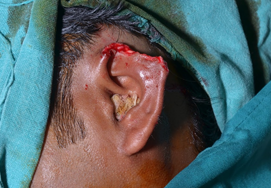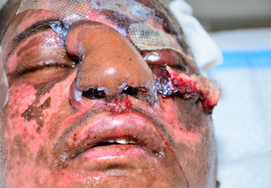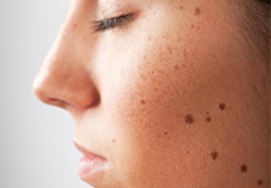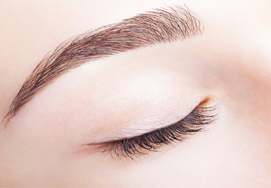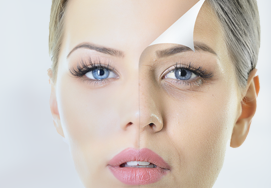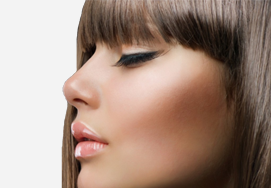Rhinoplasty
Suggested if your nose seems too wide when viewed from the front, the nasal tip droops or plunges, the tip is thickened or enlarged, your nostrils are excessively flared, and your nose is off-center or crooked
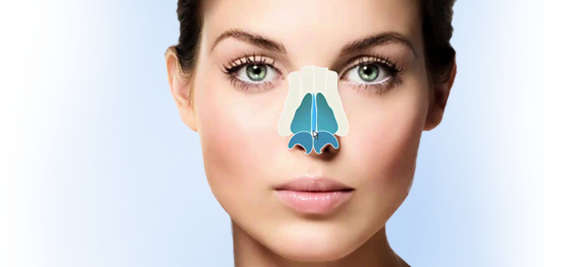
- Am I a good candidate for rhinoplasty?
- How will my plastic surgeon evaluate me for rhinoplasty?
- When will I learn about the cost of surgery?
- When can I resume my normal activities?
- How long will the results last?
Am I a good candidate for rhinoplasty?
Nose surgery is a good option for you if:How will my plastic surgeon evaluate me for rhinoplasty?
You should come to the consultation prepared to discuss your medical history. This will include information about any medical conditions you may have, medical treatments you have received, previous surgeries including repair of nasal injuries, and medications that you currently take. Your plastic surgeon may also ask whether you have difficulty breathing through your nose, suffer from allergies that may cause nasal stuffiness, or are a chronic user of nasal spray. It is important for you to provide complete information.
In evaluating you for rhinoplasty, your plastic surgeon will conduct a routine and painless examination of your internal nasal structures. Your skin quality as well as the size and shape of your nose and its relationship to your other facial features will be carefully studied. In some instances, your plastic surgeon may recommend surgery of your chin, making it either more or less prominent, to improve facial balance. This procedure can be done at the same time as your rhinoplasty.
When will I learn about the cost of surgery?
It is understandable that you would like to have information about the cost of surgery as soon as possible. Your plastic surgeon must first complete a thorough evaluation before your individualized surgical plan can be developed. Following this, the fees required for your surgery will be discussed with you. While most insurance plans will not pay for aesthetic nose reshaping, they frequently will cover surgery performed on the internal structures of the nose to improve breathing problems. Your plastic surgeon can discuss this with you at the same time of consultation.
Your Surgical Experience
The goal of your plastic surgeon and the entire staff is to make your surgical experience as easy and comfortable for you as possible.
I understand that every surgical procedure has risks, but how will I learn more so that I can make an informed decision?
Depending on the surgical technique used, a splint may be placed on the bridge of the nose for the purpose of holding the tissues in place until they have stabilized.
The subject of risks and potential complications of surgery is best discussed on a personal basis between you and your surgeon, or with a staff member in your surgeon’s office.
Some of the potential complications that may be discussed with you include hematoma (an accumulation of blood under the skin that may require removal), infection and reactions to anesthesia. Numbness of the skin following rhinoplasty may occur but is usually temporary. Occasionally, if the surgical outcome needs further improvement, additional surgery may be necessary.
Results of Your Rhinoplasty
The goal of rhinoplasty is a nose that looks natural and blends harmoniously with your other facial features.
Since the healing process is gradual, you should expect to wait up to one year to see the final results of your rhinoplasty. You are likely, however, to begin enjoying your new look within weeks of your surgery.
Occasionally, a touch up may be desired to further improve the results. If this is the case, the additional procedure is usually less extensive than the original operation.
When can I resume my normal activities?
Straining, bending and lifting should be avoided during the early postoperative period. In many instances, you may be able to return to work within a week or ten days after surgery. Most normal activities including exercise can usually be resumed within three weeks.
It will be a few months before you can expose your reshaped nose to direct sunlight. Your nose will be sensitive during this time, and you must be conscientious about using a sunblock to protect your skin. If the bones of your nose were altered, it may be a number of weeks before you can wear glasses without special support such as tape
How long will the results last?
In most instances, the results of rhinoplasty are permanent, except for possible changes associated with the normal aging process.
Maintaining a Relationship with Your Plastic Surgeon
You will return to your plastic surgeon’s office for follow-up care at prescribed intervals, at which time your progress will be evaluated.
Please remember that the relationship with your plastic surgeon does not end when you leave the operating room. If you have questions or concerns during your recovery, or need additional information at a later time, you should contact your surgeon.


